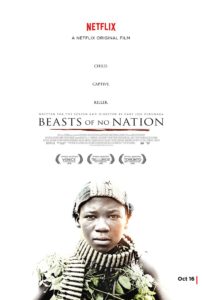Netflix Unleashes A War Child, Day and Date
DIRECTED BY CARY JOJI FUKUNAGA/2015
 Director Cary Joji Fukunaga (best known for helming the first season of HBO’s True Detective) wields a macro lens on several levels with Beasts of No Nation. Having adapted the novel of the same name by Uzodinma Iweala as part of his reported seven year effort to bring this to the screen, he focuses closely and intently on third world people in a part of the globe not often thought about by westerners. The gaze is close, detailed, and unflinching, much like using a macro lens to examine smaller realities that are right before our eyes.
Director Cary Joji Fukunaga (best known for helming the first season of HBO’s True Detective) wields a macro lens on several levels with Beasts of No Nation. Having adapted the novel of the same name by Uzodinma Iweala as part of his reported seven year effort to bring this to the screen, he focuses closely and intently on third world people in a part of the globe not often thought about by westerners. The gaze is close, detailed, and unflinching, much like using a macro lens to examine smaller realities that are right before our eyes.
For good measure, there are several actual macro shots throughout: A single droplet of water fills the screen as it gathers to fall, as abstract a sight as any you’ll see this movie year, yet an undeniably mundane occurance. Also included are a shot of red ants, a lizard, and finally grubs. These are the metaphorical flourishes amid a film that is otherwise altogether down to earth, ala The Wild Bunch. Nevertheless, the raw earth witnessed in Beasts may be red from both subterranean clay and spilled blood, but it is our world’s harsher terrain.
In a film awards season already marked with emotionally challenging fare, “Beasts” stands as particularly effective. Which is to say, it’s particularly difficult.
Shot in the overgrown jungles of Ghana, the film depicts an unspecified civil war in an unspecified West African country, specifiying its irrevocable effects on a young boy. (Agu, played remarkably by newcomer Abraham Attah). Although the events are too broadly fictionalized to qualify as any kind of history lesson, the tragic story of the film is one that is all too terribly common, across too many borders and nationalities.
Agu’s whispery, matter-of-fact voiceover informs us that soon the war will arrive to his humble village, where he lives with his family. Agu whiles away his days like most any kid, albeit one where the children are already attuned to hustling for money. In peddling obvious junk, he and his friends give the hard sell to whomever is nearby. They intentionally block the road, then demand payment from drivers to clear the path. None of this is particularly successful, but it’s clear that in his world, this mischief is what being a kid entails.

Abraham Attah goes to war in BEASTS OF NO NATION.
When the war inevitably blasts in, his old life is violently snatched away from him, and he is soon on his own, running for his life. When he is taken in as part of the bloodthirsty Commandant’s (Idris Elba) small army, he is given a place and purpose. He is also given a machine gun, slow indoctination, and orders to kill. War is boyhood mayhem played out on another scale. To be clear, Beasts of No Nation contains terribly disturbing moments of a negatively conditioned child commiting violent wartime attrocities.
That Beasts of No Nation was picked up by Netflix, is being groomed by the company for a major Oscar push, and will premiere day-and-date on its streaming platform have been widely discussed and speculated upon in terms of film industry ramifications. If the Netflix hype machine is effective, Beasts may emerge as the single most-seen Oscar nominee this year – something that’s all the most impressive considering that the only known actor in this third-world feel-bad ripped-bandaid of a film is Idris Elba, who’s memorable role is very much a supporting one.
It’s tempting to say that Fukunaga anticipated the film’s unusal distribution deal and commented on it from the outset in the film itself, as Agu and his buddies roam about trying to sell the decorative front panel of an old TV, sans the screen. In fact, the first image of the film is shot through this panel, mimicing a classic TV screen shape. It is quickly removed to demonstrate that Beasts is at its heart a big screen affair (several shots will suffer in home viewing), a Real Movie!

Idris Elba in BEASTS OF NO NATION.
Yet, as Agu climbs through the TV panel in his efforts to sell it as some sort of real-life 3D device, Fukunaga seems to be saying that whatever the screen this film is viewed upon, these are the people that matter – and they are “real”. It’s tempting to say all of that, but the reality is that the film was completed prior to Netflix buying it (for a reported $12 million, more than it would’ve likely ever grossed in what would’ve been an American art house run).
Beasts of No Nation is convientently comparable to Beasts of the Southern Wild beyond the obvious title similarities. Both involve young children thrust into catylsmic situations, and their age-centric way to processing how their world has changed. Both are grassroots and gritty, effectively taking us into their believable other-worlds. But whereas Hushpuppy is all about having future people know that she lived with her daddy in the Bathtub, Agu’s desire for how he’s remembered is likely considerably murkier, and with good reason. It is, however, no less cinematically honest. Beasts of No Nation is a beast of a film that will not be forgotten, however its seen.

